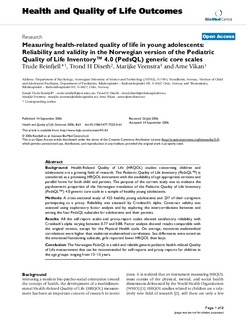Measuring health-related quality of life in young adolescents: Reliability and validity in the Norwegian version of the Pediatric Quality of Life Inventory™ 4.0 (PedsQL) generic core scales
Journal article, Peer reviewed

View/
Date
2006Metadata
Show full item recordCollections
- Institutt for psykologi [2886]
- Publikasjoner fra CRIStin - NTNU [37221]
Abstract
Background: Health-Related Quality of Life (HRQOL) studies concerning children and
adolescents are a growing field of research. The Pediatric Quality of Life Inventory (PedsQL™) is
considered as a promising HRQOL instrument with the availability of age appropriate versions and
parallel forms for both child and parents. The purpose of the current study was to evaluate the
psychometric properties of the Norwegian translation of the Pediatric Quality of Life Inventory
(PedsQL™) 4.0 generic core scale in a sample of healthy young adolescents.
Methods: A cross-sectional study of 425 healthy young adolescents and 237 of their caregivers
participating as a proxy. Reliability was assessed by Cronbach's alpha. Construct validity was
assessed using exploratory factor analysis and by exploring the intercorrelations between and
among the four PedsQL subscales for adolescents and their parents.
Results: All the self-report scales and proxy-report scales showed satisfactory reliability with
Cronbach's alpha varying between 0.77 and 0.88. Factor analysis showed results comparable with
the original version, except for the Physical Health scale. On average, monotrait-multimethod
correlations were higher than multitrait-multimethod correlations. Sex differences were noted on
the emotional functioning subscale, girls reported lower HRQOL than boys.
Conclusion: The Norwegian PedsQL is a valid and reliable generic pediatric health-related Quality
of Life measurement that can be recommended for self-reports and proxy-reports for children in
the age groups ranging from 13–15 years.